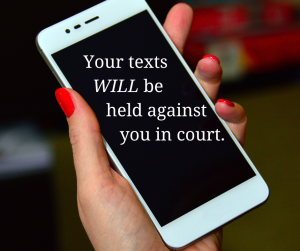Alex Jones lawyers (perhaps inadvertently) turned 2-years of texts to the lawyers for the Sandy Hook families. What would be the repercussions for the disclosure if the trial were in Illinois?
The parents of a 6-year-old child that was killed in the Sandy Hook shooting had requested in discovery that Alex Jones turn over all the emails that related to shooting. Jones previously testified that he had searched his phone for texts about the Sandy Hook School shooting and found none, but Jones’s lawyers proved otherwise.
Jones’s lawyers accidentally sent the entire contents of Jones’s cell phone to the parents’ attorneys. Some of the messages should have been turned over in response to the parents’ discovery requests. Other contents should have been protected and kept between him and his attorneys via attorney-client privilege. Regardless, the parents’ lawyers get to keep and use all of the messages.
If this happened in Illinois what would be the outcome under the Illinois Rules of Civil Procedure?
In 2013 the Illinois Supreme Court adopted an amendment to Supreme Court Rule 201 and added Rule 502 to the Illinois Rules of Evidence, which applies to the “inadvertent disclosure” of evidence. This is similar to Rule 502 under the Federal Rules of Evidence.
Illinois Rule of Evidence 502(b) provides that a privilege is not waived if:
- The disclosure is inadvertent;
- The holder of the privilege or protection took reasonable steps to prevent disclosure; and
- The holder promptly took reasonable steps to rectify the error, including (if applicable) following Supreme Court Rule 201(p).
Illinois Supreme Court Rule 201, entitled “General Discovery Provisions,” addresses assertions of privilege or work product after disclosure in discovery. Rule 201(p) states that if information was inadvertently produced in discovery and is subject to a claim of privilege or of work-product protection, the party making the claim can notify any party that received the information of the claim and the basis for it. After being notified, each receiving party must return or destroy the specified information, and not use or disclose the information until the claim is resolved.
Unlike Illinois state courts, Texas gives ten days to the producing party to respond to a notice of inadvertent disclosure, after which the privilege would be deemed waived.
Additionally, each state has its own ethical rules. Illinois Rules of Professional Conduct 4.4, adopted in Jan. 2013, provides: “A lawyer who receives a document or electronically stored information relating to the representation of the lawyer’s client and knows that the document or electronically stored information was inadvertently sent shall promptly notify the sender.”
If the Jones trial was in Illinois, all Jones’s counsel had to do was notify the parent’s counsel that the texts supplied contained privileged attorney-client communications and non-responsive confidential information. But, as Plaintiffs’ counsel laid out in the Texas state court, the defense counsel did not take any steps to identify as privileged or protect it any way, even after Plaintiffs’ counsel notified the defense of their error. Jones’s defense counsel did reply to an email from Plaintiffs’ counsel and said that there was a mistake in the file transfer and to disregard the link that contained the contents of Jones’s phone. But the response came 12 days after the accidental production. Also, there was no objection from Jones’s attorney during the declaration either.
The Plaintiffs’ counsel correctly asserted that merely citing a “mistake” and asking Plaintiffs to “disregard the link” is insufficient to prevent waiver in Texas state court that created the ten-day response time for a notice of inadvertent disclosure. An Illinois state court, on the other hand, seems to protect attorneys less from the consequences of inadvertent waiver with no set response time.
Illinois state court would have followed the above-mentioned Federal Rule of Evidence 502 and Illinois Supreme Court Rule 201(p) guidelines. Plaintiffs’ counsel, following ethical guidelines, notified the defense counsel of the potential error. Yet, the defense counsel failed to respond quickly and demand the return of the messages and failed to object at the time the information was presented during cross-examination. Thus, the Plaintiff’s attorneys would be able to use all of the messages if this case would have been filed in Illinois state court.
Lawyers sometimes make mistakes in e-discovery. Big surprise! Lawyers are not perfect! But failure to take steps to timely rectify the mistakes is where Jones’s counsel made a crucial error with the end result being that the text messages – which probably could have been deemed to be privileed – were all admissible in court against Jones. This is an example of how the handling of ESI – Electronically Stored Information – is a critical part of a lawsuit and lawyers need to be aware of the unique problems associated with ESI.
(RESEARCH FOR THIS ARTICLE WAS CONDUCTED BY KASEY HUGHES, A LAW STUDENT AT DEPAUL UNIVERSITY LAW SCHOOL.)
 Chicago Business Attorney Blog
Chicago Business Attorney Blog


